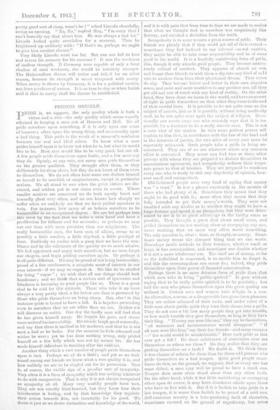THE QUALITY OF MERCY IN WAR.
R. ROOSEVELT, who successfully intervened on behalf
of a German.American boy of nineteen named Kenneth Triest,• about to he tried in London for espionage, has not failed to dwell upon the obvious contrast between the British leniency and what he calls the butchery of Miss Cavell by the Germans. Apparently there was no doubt whatever about the guilt of Triest. The boy's father, however, had the happy thought of appealing to Mr. Roosevelt, who made repre- sentations to the British Ambassador at Washington. Mr: Roosevelt's request for indulgence was bared on a statement that the boy was insane. In writing to Mr. Wainwright, counsel for the boy's father, Mr. Roosevelt explained that the British Government were willing to release the boy if the father would come and take him back to the United States and make himself personally responsible for him. Sir Edward Grey and Mr. Balfour, after going carefully over the facts, could find no traces of madness in Tricat, but they were nevertheless ready to Ore him the benefit of the doubt and not bring him to trial if the father would accept the one condition of the boy's release. Otherwise the trial would proceed, and could hardly fail to cad in condemnation. Mr. Roosevelt, after acknowledging the father's acceptance of the condition, goes on :- " If the boy shall appear to be still of unbalanced mind, my own judgment is that he ought to be sent to some sanatorium, at least until the war is over. If he has in any way recovered, then Mr. Triest should bring him to mo and give in° an opportunity to explain told m in the presence of his father and yourself the terrible character of his offence. I wish him to understand that the offence in his case is not only an offence against the law of nations, but an offence against the law of honour as understood by gentlemen, an offence which, if it had not been committed when his mind was unbalanced, would unfit him for association with any soldiers of a high standard of professional and personal probity and honour. Moreover, he should understand and appreciate the contrast between the conduct of the British Government in his case and the conduct of the German Government in permitting and sanctioning what, in order to be truthful, I can only describe as the butchery of Miss Gavel. Miss Cavell was butchered for actions such as were taken by hundreds, probably thousands, of women in our Civil War, and it never entered the heads of either the Union or the Confederate Government that it was possible so much oven as to consider putting to death these women. The execution of Miss Cavell was a deed of black horror, and when I saw the account of it I confess I did not believe the British Government would be inclined to show mercy to young Triest, for of course the British Government had a thousandfold more justification for insisting upon the execution of Triest than the German Government had for putting to death 141iss Cavell. The boy should be made to understand the mercy and magnanimity with which the British Government has treated him."
It is to be noticed that Mr. Roosevelt, as though specially to underline the mercy shown by the British Government, suggests that the boy should be prevented' from doing further harm by being put away during the war. The British Government stipulated nothing of this sort. They asked for the father's pledge and nothing more.
Mr. Roosevelt's straight and manly words have been read in this country with great pleasure. We are all grateful for the certificate of good conduct. But, after all, we must not pretend that the act of clemency to a boy who was probably neurotic and erratic in his ways was a wonderful deed of magnanimity. 3t is only by contrast with German ways that it can seem to be such. If Germany had not blotted out all the humane customs which had gradually established themselves during many centuries, we should consider that the release of Triest was nothing unusual, judged by the standard of even mediaeval soldiers. Edward III. and his troops would have thought it shame not to regard chivalrous acts as part of the equipment of every accomplished soldier. If the teaching of humane custom in relation to spies can be summarized, it surely amounts to this : that the execution of spies is in every way justifiable and necessary, so that no nation at war can afford to let them go free as a rule, but that, nevertheless, a Government capable of mercy are glad, and even anxious, to discover an excuse for exercising leniency. The spies who have been executed in England during the war had to be put to death. There was no conceivable way of overlooking their flagrant guilt. All that could be done was to let the law take its course, and salute as brave men those Germans who had been caught at the most dangerous of occupations, and who met their en I with all courage. But when a wly out is indicated in sincerity by a friend, it is the part of a humane Government to make use of it. They arc only too glad to know that they can be merciful while still being faithful to their laws, and just to themselves and the nation's interests.
Mr. Roosevelt belongs to a nation which has a great record of right practice in this matter. During the American Civil War many spies were of course shot, but hundreds were allowed to live for whom some reasonable excuse could bo framed. Mercy was never carried further in war than it was by Lincoln. He could with difficulty persuade himself to sign a death-warrant. As for women, he never dreamed of allowing them to be punished heavily, although Washington swarmed with Southern women who continually helped the Confederate cause. One could hardly have counted the number of " patriotic" Southern girls within the Northern lines. " If," said Lincoln, when asked to sanction the execution of a boy deserter, " a man had more than one life, I think a little hanging would not hurt this one, but after ho is once dead we cannot bring him back, no matter how sorry we may be, so the boy should be pardoned." Federal generals used to complain that when Lincoln had given teem leave to carry out executions in case of necessity, he would not
even then keep his word. He used continually to intervene to save • a culprit. His sympathy with frailty in the military life became
over more lively. On one occasion General Butler was telling him of the number of desertions. " How can it be stopped ? " asked Lincoln. " Shoot every deserter," said Butler. " You may be right," replied Lincoln, " probably are ; but, Lord help me, how can I have a butcher's day every Friday in the Army of the Potomac ? " Of cowards he used to say, with humorous indulgence, that it was impossible for a man always to, control his legs. " And how do I know," he asked once when his sanction of a death sentence was sought, " that I should not run away myself ? " Of course, Lincoln's physical courage was well known, but like many brave men he was strangely slow to condemn timidity. His leniency was expressed in countless humorous sallies. When the Judge Advocate-General laid a case before him that seemed to require the death sentence, Lincoln said : " I will put this by till I can settle in my mind whether this soldier can better serve the country dead than living." He was very fond of taking refuge in his droll theory that a man could not control his legs. Ho had in his pigeon- holes the evidence in a number of cases which were officially entitled " Cowardice in the Face of the Enemy," but ho always spoke of them as his " leg cases." On the day when Lincoln uttered his sally about " whether this soldier can better servo the country dead than living," Judge Holt laid before him a particularly flagrant case. A man had demoralized his regiment at a crisis by throwing away his rifle and hiding himself. Ho was without relations dependent on him, and he was, moreover, proved to be an incurable camp thief.. This man, Judge Holt suggested, surely satisfied the President's condition of better serving his country dead than living. " I think," said Lincoln, picking up the evidence of the case, " I'll put it with my leg cases."
No amount of evidence could ever persuade him to nonsent to the execution of a youth. And frankness in a condemned man was invariably a short cut to his forgiveness ; he could scarcely believe that it was right to put a man with redaeming qualities beyond the possibility of exercising them. One of his arguments on behalf of youth was expressed in his famous auswer to the New York Democrats who had protested that in arresting the Copperhead agitator Vallandigham he was killing free institutions. " Must I shoot a simple-minded soldier boy who deserts, while I must not touch a hair of the wily agitator who induces him to desert ? This is none the less injurious when effected by getting a father, or brother, or friend into a public meeting, mid then working upon his feelings till he is persuaded to write to the soldier boy that he is fighting in a bad cause, for a wicked administration of a contemptible Government, too weak to arrest and punish him if he desert. I think that in such a case to silence the agitator and save the boy is not only constitutional. but withal a groat mercy." Mr. John Hay used to toll a story of Lincoln's almost desperate habit of trying to find an excuse for not carrying out the law of which he admitted the necessity. " I was at college with him, Sir," said Hay, speaking of a man condemned to death. "A
pretty good sort of chap, wasn't he ? " asked Lincoln cheerfully, seeing an opening. " No, Sir," replied Hay, " I'm sorry that I can't honestly say that about him. He was always a bad lot." Lincoln looked quite crestfallen for a moment. Then he brightened up suddenly with : "If that's so, perhaps we ought to give him another chance."
Very likely Lincoln went too far. But can one fail to love and revere his memory for his excesses ? It was the weakness of endless strength. If Germany were capable of only a faint shadow of such weakness, she would be infinitely stronger. Tho Hohenzollern throne will totter and fall, if for no other reason, because its strength is never tempered with mercy. When mercy is shown by Germany, it is for a political motive, not from goodness of nature. It is as true to-day as when Isaiah said it that in mercy shall the throne be established.





















































 Previous page
Previous page